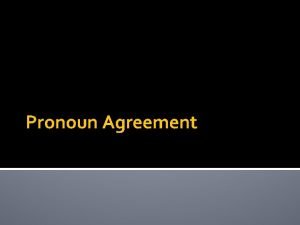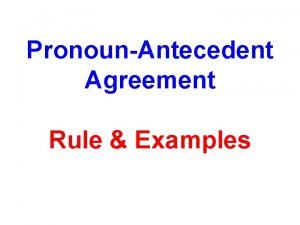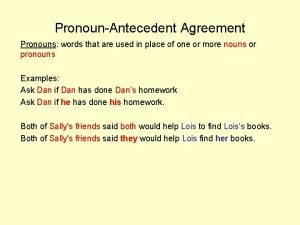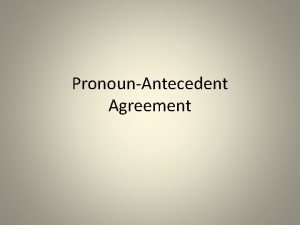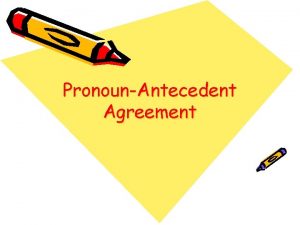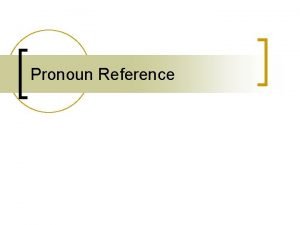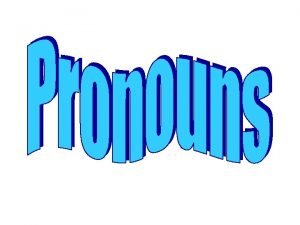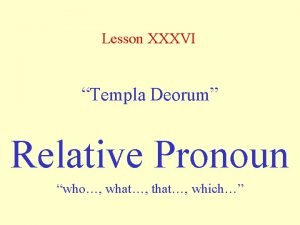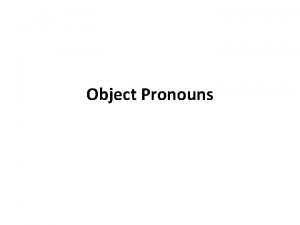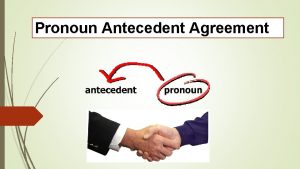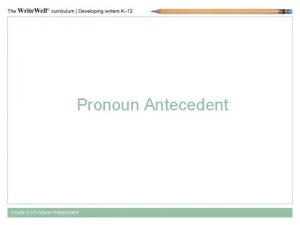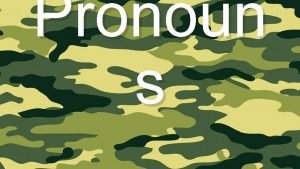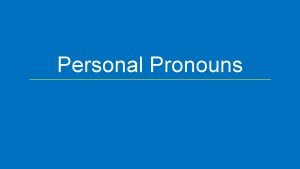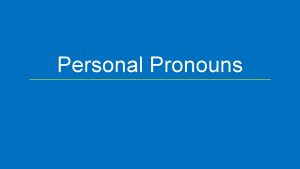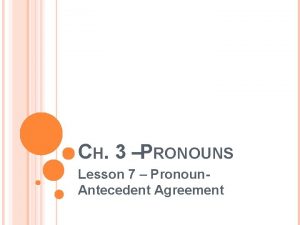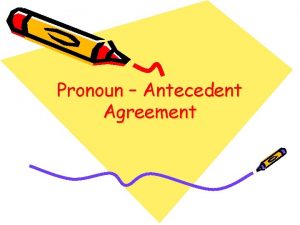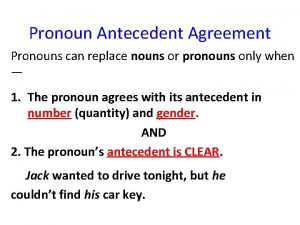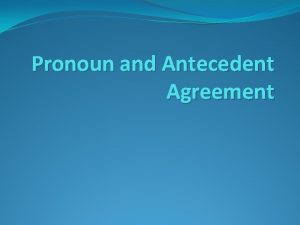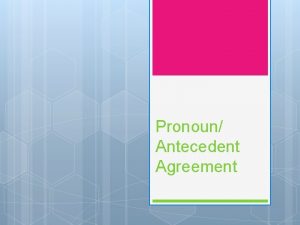Pronoun Antecedent Agreement Pronouns A pronoun is a















- Slides: 15

Pronoun. Antecedent Agreement

Pronouns • A pronoun is a word used in place of a noun or of more than one noun. • Ex. Those are the boots Jim bought yesterday.

Pronouns • Types of Pronouns – Personal – Relative – Interrogative – Demonstrative – Indefinite – Reflexive/Intensive – Possessive

Antecedents • A word that a pronoun stands for is called its antecedent. • Ex. Those are the boots Jim bought yesterday. • Ex. They went home. Kim followed them.

Pronouns and Antecedents Rule #1 • A pronoun agrees with its antecedent in gender and in number.

Pronouns and Antecedents • Singular pronouns refer to singular antecedents. Plural pronouns refer to plural antecedents. • Ex. Abraham won his bicycle in a contest. • Ex. The swimmers took their gold medals with them.

Pronouns and Antecedents • A few singular pronouns indicate gender. • He, him, his and himself = masculine • She, hers, and herself = feminine • It, its, and itself = neutral

Pronouns and Antecedents Rule #2 • Singular pronouns are used to refer to the following antecedents: • anybody, anyone, each, either, everybody, everyone, neither, nobody, no one, somebody, and someone – Note that these are all indefinite pronouns

Pronouns and Antecedents • If the antecedent may be either masculine or feminine, use both masculine and feminine pronouns to refer to it. • Ex. Everyone who wants a ride should raise his or her hand. • Ex. Somebody left his or her books behind.

Pronouns and Antecedents • Note: You can often avoid the his or her construction by revising the sentence to use the plural forms of both the pronoun and its antecedent. • Ex. Everyone sent in his or her dues • Ex. All of the members sent their dues.

Pronouns and Antecedents Rule #3 • Use a singular pronoun to refer to two or more singular antecedents joined by or or nor. • Ex. Either Ralph or Peter always walks his dog at the park.

Pronouns and Antecedents Rule #3 • Note: Revise awkward constructions caused by antecedents of different genders. • Awk: Either Crystal or Ben will sing his solo. • Revised: Either Crystal will sing her solo, or Ben will sing his.

Pronouns and Antecedents Rule #4 • Use a plural pronoun to refer to two or more singular antecedents joined by and. • Ex. If Monica and Leroy want to participate, tell them to arrive at 7: 00 p. m. sharp. • Ex. Cassie, Eduardo, and Liza have turned in their projects.

Pronouns and Antecedents Rule #5 • When a relative pronoun is the subject of an adjective clause, the verb in the clause agrees with the word to which the relative pronoun refers.

Pronouns and Antecedents Rule #5 • Ex. My ballet class, which meets on Wednesday, is planning a recital. (which refers to the singular noun class) • Ex. I know people who build boats. (who refers to the plural noun people)
 What is the basic principle of pronoun antecedent agreement
What is the basic principle of pronoun antecedent agreement What is the basic principle of pronoun antecedent agreement
What is the basic principle of pronoun antecedent agreement Title of single entities examples
Title of single entities examples Pronoun and antecedent
Pronoun and antecedent Antecedent agreement
Antecedent agreement Pronoun antecedent examples
Pronoun antecedent examples Define pronoun antecedent
Define pronoun antecedent What is a antecedent pronoun
What is a antecedent pronoun Relative clause whom
Relative clause whom Antecedent of pronoun meaning
Antecedent of pronoun meaning Antecedent pronoun agreement
Antecedent pronoun agreement Subject pronoun and object pronoun
Subject pronoun and object pronoun Pronoun antecedent
Pronoun antecedent Latin relative pronouns
Latin relative pronouns Pronouns singular and plural
Pronouns singular and plural Italicized pronoun examples
Italicized pronoun examples

